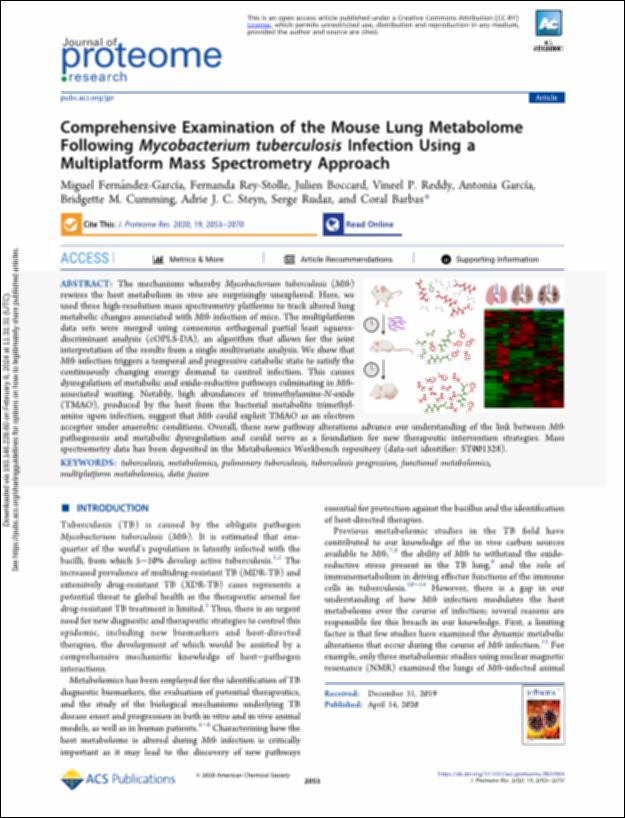Please use this identifier to cite or link to this item:
http://hdl.handle.net/10637/15421Comprehensive Examination of the Mouse Lung Metabolome Following Mycobacterium tuberculosis Infection Using a Multiplatform Mass Spectrometry Approach
| Title: | Comprehensive Examination of the Mouse Lung Metabolome Following Mycobacterium tuberculosis Infection Using a Multiplatform Mass Spectrometry Approach |
| Authors : | Fernández García, Miguel Rey-Stolle, María Fernanda Boccard, Julien Reddy, Vineel P. García Fernández, Antonia Cumming, Bridgette M. Steyn, Adrie J. C. Rudaz, Serge Barbas Arribas, Coral. |
| Keywords: | Tuberculosis; Metabolomics; Pulmonary tuberculosis; Tuberculosis progression; Functional metabolomics; Multiplatform metabolomics; Data fusion |
| Publisher: | American Chemical Society |
| Citation: | Fernández-García M, Rey-Stolle F, Boccard J, Reddy VP, García A, Cumming BM, Steyn AJC, Rudaz S, Barbas C. Comprehensive Examination of the Mouse Lung Metabolome Following Mycobacterium tuberculosis Infection Using a Multiplatform Mass Spectrometry Approach. J Proteome Res. 2020 May 1;19(5):2053-2070. doi: 10.1021/acs.jproteome.9b00868. Epub 2020 Apr 23. PMID: 32285670; PMCID: PMC7199213. |
| Abstract: | The mechanisms whereby Mycobacterium tuberculosis (Mtb) rewires the host metabolism in vivo are surprisingly unexplored. Here, we used three high-resolution mass spectrometry platforms to track altered lung metabolic changes associated with Mtb infection of mice. The multiplatform data sets were merged using consensus orthogonal partial least squaresdiscriminant analysis (cOPLS-DA), an algorithm that allows for the joint interpretation of the results from a single multivariate analysis. We show that Mtb infection triggers a temporal and progressive catabolic state to satisfy the continuously changing energy demand to control infection. This causes dysregulation of metabolic and oxido-reductive pathways culminating in Mtbassociated wasting. Notably, high abundances of trimethylamine-N-oxide (TMAO), produced by the host from the bacterial metabolite trimethylamine upon infection, suggest that Mtb could exploit TMAO as an electron acceptor under anaerobic conditions. Overall, these new pathway alterations advance our understanding of the link between Mtb pathogenesis and metabolic dysregulation and could serve as a foundation for new therapeutic intervention strategies. Mass spectrometry data has been deposited in the Metabolomics Workbench repository (data-set identifier: ST001328). |
| URI: | http://hdl.handle.net/10637/15421 |
| Rights : | http://creativecommons.org/licenses/by-nc-nd/4.0/deed.es |
| ISSN: | 1535-3893 |
| Issue Date: | 14-Apr-2020 |
| Center : | Universidad San Pablo-CEU |
| Appears in Collections: | Medicina |
Items in DSpace are protected by copyright, with all rights reserved, unless otherwise indicated.


